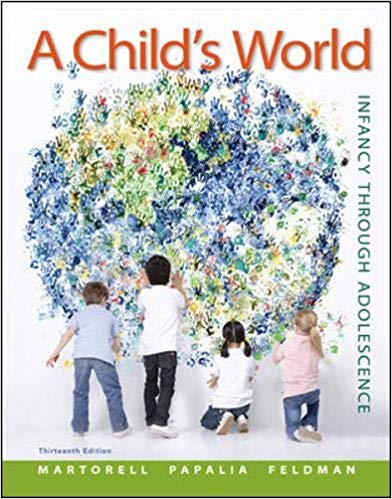Test Bank For A Child’s World Infancy Through Adolescence 13th Edition By Gabriela Martorell
Digital item No Waiting Time Instant DownloadISBN-13: 978-0078035432 ISBN-10: 0078035430
In Stock
Original price was: $65.00.$50.00Current price is: $50.00.
Test Bank For A Child’s World Infancy Through Adolescence 13th Edition By Gabriela Martorell
Chapter 03
Forming a New Life: Conception, Heredity, and Environment
Multiple Choice Questions
1. Bronfenbrenner’s _____ approach examines the layers of social systems and how these layers interact.A. interactionistB. bioecologicalC. behavioristD. cognitive
refer to page 60
APA LO: 1.2Bloom’s Taxonomy: RememberConnect LO: 3.1: Describe how conception normally occurs, and how beliefs about conception changed.Learn Smart LO: Conceiving new life.
2. Which of the following factors can have vast consequences on a child’s development?A. Whether the birth comes about through normal or extraordinary meansB. Whether the birth is welcome or unwantedC. How old the parents are when the child is conceived or adoptedD. All of the above
refer to page 60
APA LO: 1.2Bloom’s Taxonomy: RememberConnect LO: 3.1: Describe how conception normally occurs, and how beliefs about conception changed.Learn Smart LO: Conceiving new life.
3. ______ suggested that the production of male babies was the natural order of things and that a female came about only if development was disturbed.A. Bronfenbrenner.B. Aristotle.C. Skinner.D. Mendel.
refer to page 61
APA LO: 1.2Bloom’s Taxonomy: RememberConnect LO: 3.1: Describe how conception normally occurs, and how beliefs about conception changed.Learn Smart LO: Conceiving new life.
4. The union of sperm and ovum to produce a zygote is known asA. the two-seed theory.B. ovulation.C. attachment.D. fertilization.
refer to page 61
APA LO: 5.2Bloom’s Taxonomy: RememberConnect LO: 3.1: Describe how conception normally occurs, and how beliefs about conception changed.Learn Smart LO: Recall the process of fertilization.
5. In fertilization, the male and the female gametes combine to create a single cell called a(n) _____, which then duplicates itself again and again to become a baby.A. zygoteB. ovumC. spermD. follicle
refer to page 61
APA LO: 1.2Bloom’s Taxonomy: RememberConnect LO: 3.1: Describe how conception normally occurs, and how beliefs about conception changed.Learn Smart LO: Recall the definition of zygote.
6. Ovulation refers to theA. fertilization of an ovum by a sperm.B. expulsion of an ovum from the ovary.C. passage of an ovum through the vagina and out of the woman’s body.D. absorption of an ovum by the woman’s white blood cells.
refer to page 61
APA LO: 1.2Bloom’s Taxonomy: RememberConnect LO: 3.1: Describe how conception normally occurs, and how beliefs about conception changed.Learn Smart LO: Recall the process of fertilization.
7. Fertilization usually takes place in the _____ as the ovum make the trip from the ovary to the uterus.A. wombB. fallopian tubeC. ovariesD. cervix
refer to page 61
APA LO: 1.2Bloom’s Taxonomy: RememberConnect LO: 3.1: Describe how conception normally occurs, and how beliefs about conception changed.Learn Smart LO: Recall the process of fertilization.
8. Sperm are produced in the _____ at a rate of several hundred million a day and are ejaculated in the semen during sexual climax.A. ovaryB. cervixC. testesD. uterus
refer to page 61
APA LO: 1.2Bloom’s Taxonomy: RememberConnect LO: 3.1: Describe how conception normally occurs, and how beliefs about conception changed.Learn Smart LO: Recall the process of fertilization.
9. Daniel and Nellie are hoping to maximize Nellie’s chances of becoming pregnant. When should they have intercourse?A. between the 6th and 21st days of the menstrual cycleB. 5 days after the onset of ovulationC. 14 days after the onset of menstruationD. 28 days after the onset of menstruation
refer to page 61
APA LO: 1.2Bloom’s Taxonomy: ApplyConnect LO: 3.1: Describe how conception normally occurs, and how beliefs about conception changed.Learn Smart LO: Recall the process of fertilization.
10. Infertility is the inability to conceive after _____ months of trying to have a baby.A. 3 to 6B. 6 to 9C. 9 to 12D. 12 or more
refer to page 61
APA LO: 1.2Bloom’s Taxonomy: RememberConnect LO: 3.2: Understand what causes infertility, and the alternative ways of becoming parents.Learn Smart LO: Recall infertility.


Reviews
There are no reviews yet.